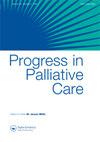Comment on: ‘Medical students do not feel confident in managing palliative care as future doctors’
IF 0.9
Q4 PUBLIC, ENVIRONMENTAL & OCCUPATIONAL HEALTH
引用次数: 0
Abstract
Dear Editor, I read with great interest the article ‘Medical students do not feel confident in managing palliative care as future doctors’ by Melgaard and Neergaard [1] in Progress in Palliative Care. I wanted to offer my perspective on the article as a medical student with an interest in palliative care as well as a student who has faced many interruptions to my undergraduate medical education due to the COVID-19 pandemic. I am not surprised that the results of the study by Melgaard and Neergaard [1] found that medical students do not feel confident in managing palliative care. The literature recognises that medical students are often shielded from seeing really sick patients and undergraduate medical training is centred around fixing people [2]. I have often observed amongst my peers the harmful ideology that a dying patient is a failure. We fail our patients when we cannot see beyond ‘fixing their ailment’ and as a result, neglect to bring comfort and dignity to their lives. I am concerned that the lack of confidence and negative attitudes towards palliative care in medical students may stem from lack of exposure to patients in palliative care. It is interesting that a study by Hammel et al. [3] found that the British palliative care curriculum lead to medical students with ‘more confidence and more supportive attitudes towards PC (palliative care)’ compared to students from the United States. Medical education has had to face huge disruptions, challenges and changes due to the COVID-19 pandemic. I read an article by Boland et al. [4] that highlighted, as junior doctors we will inexorably have to face caring for a dying patient throughout our career. However, by the time I graduate, I will have only encountered palliative care via online teaching. It concerns me that I will not have had first-hand experience with the complex interplay of symptom management, psychological, social and spiritual support seen in palliative care. How I am supposed to forge empathic connections with patients with incurable illnesses, if I have never witnessed the profound difficulties of their experience? I agree with the author’s narrative that it very important to evaluate student confidence and knowledge, in particular when implementing new, elaborate curriculum changes in palliative care. This article is even more pertinent to the undergraduate medical curriculum now. I believe it raises questions as to whether my own medical school and potentially other British medical schools have done enough to evaluate confidence and attitudes towards palliative care. I think it is crucial that more studies are conducted to ascertain the impacts of the COVID-19 pandemic on undergraduate palliative care teaching. Yours sincerely,评论:“医学生对作为未来医生管理姑息治疗没有信心”
亲爱的编辑,我饶有兴趣地阅读了Melgaard和Neergaard[1]在《姑息治疗进展》中发表的文章《医学生作为未来的医生对管理姑息治疗没有信心》。作为一名对姑息治疗感兴趣的医学生,以及一名因新冠肺炎疫情而面临本科医学教育多次中断的学生,我想谈谈我对这篇文章的看法。Melgaard和Neergaard[1]的研究结果发现,医学生对管理姑息治疗没有信心,我对此并不感到惊讶。文献认识到,医学生经常被屏蔽,看不到真正生病的病人,而本科生的医学培训主要集中在治疗病人[2]。我经常在同龄人中观察到一种有害的意识形态,即垂死的病人是失败者。当我们不能超越“治疗他们的疾病”,从而忽视了给他们的生活带来安慰和尊严时,我们就会辜负我们的病人。我担心,医学生对姑息治疗缺乏信心和消极态度,可能源于缺乏接触姑息治疗患者的机会。有趣的是,Hammel等人[3]的一项研究发现,与美国学生相比,英国的姑息治疗课程使医学生“对PC(姑息治疗)更有信心和支持态度”。由于新冠肺炎大流行,医学教育不得不面临巨大的干扰、挑战和变化。我读了博兰德等人[4]的一篇文章,文章强调,作为初级医生,我们在整个职业生涯中不可避免地要面对照顾垂死病人的问题。然而,到我毕业的时候,我只会通过在线教学遇到姑息治疗。我担心的是,我不会对姑息治疗中症状管理、心理、社会和精神支持的复杂相互作用有第一手经验。如果我从未目睹过他们经历的深刻困难,我应该如何与患有不治之症的患者建立同理心?我同意作者的说法,即评估学生的信心和知识非常重要,尤其是在实施姑息治疗新的、精心设计的课程改革时。这篇文章更适合现在的医学本科生课程。我认为这引发了一个问题,即我自己的医学院以及可能的其他英国医学院是否在评估对姑息治疗的信心和态度方面做得足够。我认为,进行更多的研究以确定新冠肺炎大流行对本科生姑息治疗教学的影响至关重要。您诚挚的:,
本文章由计算机程序翻译,如有差异,请以英文原文为准。
求助全文
约1分钟内获得全文
求助全文
来源期刊

PROGRESS IN PALLIATIVE CARE
PUBLIC, ENVIRONMENTAL & OCCUPATIONAL HEALTH-
CiteScore
2.60
自引率
11.80%
发文量
24
期刊介绍:
Progress in Palliative Care is a peer reviewed, multidisciplinary journal with an international perspective. It provides a central point of reference for all members of the palliative care community: medical consultants, nurses, hospital support teams, home care teams, hospice directors and administrators, pain centre staff, social workers, chaplains, counsellors, information staff, paramedical staff and self-help groups. The emphasis of the journal is on the rapid exchange of information amongst those working in palliative care. Progress in Palliative Care embraces all aspects of the management of the problems of end-stage disease.
 求助内容:
求助内容: 应助结果提醒方式:
应助结果提醒方式:


